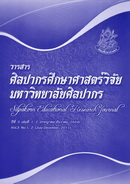การประเมินหลักสูตรศึกษาศาสตรบัณฑิต สาขาวิชาภาษาอังกฤษ คณะศึกษาศาสตร์ มหาวิทยาลัยศิลปากร
คำสำคัญ:
การประเมินหลักสูตร, รูปแบบการประเมินซิปป์ไอ, องค์ประกอบการประเมิน, programme evaluation, CIPPI model, evaluative items/elementsบทคัดย่อ
บทคัดย่อ
การวิจัยครั้งนี้มีวัตถุประสงค์ 1) เพื่อประเมินหลักสูตรศึกษาศาสตรบัณฑิต สาขาวิชาภาษาอังกฤษ 2) เพื่อศึกษาแนวทางการพัฒนาปรับปรุงหลักสูตรดังกล่าว เป็นการวิจัยประเมินผลโดยใช้รูปแบบการประเมิน ซิปป์ไอ (CIPPi model) กลุ่มตัวอย่าง คือ ผู้ทรงคุณวุฒิ คณาจารย์ บัณฑิต นักศึกษาปัจจุบัน ผู้ใช้บัณฑิต ผู้บริหารคณะศึกษาศาสตร์ ผู้บริหารสถานศึกษา ครูพี่เลี้ยง และศึกษาเอกสารที่เกี่ยวข้อง เครื่องมือที่ใช้ใน การเก็บข้อมูลคือ แบบสัมภาษณ์และแบบสอบถาม มีผลการวิจัยดังนี้ 1) ด้านสภาพแวดล้อม สาขาและภาค วิชาควรวางแผนร่วมกันพัฒนาอาจารย์รุ่นใหม่ สาขามีจุดแข็งคือความรู้ความสามารถของคณาจารย์และ หลักสูตรมีชื่อเสียง จุดอ่อนคือความสามารถทางภาษาอังกฤษของนักศึกษาแรกเข้าไม่สูงนัก 2) ด้านปัจจัย นำเข้า องค์ประกอบย่อยได้รับคะแนนการประเมินระดับมาก แต่มีข้อเสนอแนะว่า ควรเพิ่มการเชื่อมโยงกับ ชุมชนในวัตถุประสงค์ของหลักสูตร ควรยกเลิก หรือปรับปรุงบางรายวิชา และเพิ่มวัสดุอุปกรณ์สำหรับการ ค้นคว้า 3) ด้านกระบวนการ ทุกองค์ประกอบย่อยได้รับระดับความพึงพอใจในระดับมากถึงมากที่สุด แต่ก็มี ข้อเสนอแนะว่า ควรเพิ่มให้นักศึกษาได้ค้นคว้าด้วยตนเอง ควรมีเกณฑ์ประเมินที่ชัดเจนและต่อเนื่อง และ บุคลากรของคณะควรประชุมร่วมกับสถานศึกษาเรื่องการฝึกสอน 4) ด้านผลผลิต ผลสัมฤทธิ์ทางการศึกษา ของบัณฑิตแสดงว่า หลักสูตรได้รับการยอมรับจากประชาคมเป็นอย่างดี และผู้ใช้บัณฑิตแสดงระดับความ พึงพอใจในระดับมาก 5) ด้านผลกระทบ ผู้ใช้บัณฑิตพึงพอใจต่อผลการปฏิบัติงานของบัณฑิตในระดับมาก มีข้อเสนอแนะคือ บัณฑิตควรประเมินผลงานของตนเองและปรับปรุงอย่างต่อเนื่อง
โดยสรุป หลักสูตรมีระดับคุณภาพหรือการมีผลผลิตตามวัตถุประสงค์ในระดับดี สมควรที่จะ ดำเนินการต่อไป เพียงแต่ต้องปรับปรุงองค์ประกอบย่อยบางประเด็นเพื่อให้มีคุณภาพมากขึ้น
คำสำคัญ: การประเมินหลักสูตร รูปแบบการประเมินซิปป์ไอ องค์ประกอบการประเมิน
Abstract
This research aimed to: 1) evaluate the Bachelor of Education programme in English and 2) consider improvements to the programme. This evaluative research was based on the CIPPI model. The sample included experts, lecturers, graduates, current students, employers/ advisors, administrators to the Faculty of Education, administrators to schools and school supervisors. Relevant documents were also studied. The instruments were interview schedules and questionnaires. The results included: 1) Context: Both the section and the department should cooperate to improve new lecturers. Highly experienced and expert lecturers were the strength of the section; however, its weakness was the low level of students’ English proficiency before admissions. 2) Input: All evaluative items were scored at a high level. However, some suggested that one of the objectives state collaborations with local communities, some courses be cancelled or modified, and a number of facilities be increased. 3) Process: The samples’ satisfaction ranged from a high to the highest level; however, there should be more self-study for students, more precise and consistent criteria for assessment, and meetings between staff from the faculty and from schools for the practicum. 4) Product: The programme was well recognised among people. Moreover, employers/advisors also showed high satisfaction with the graduates. 5) Impact: The employers/advisors were satisfied with the graduates’ performance at a high level, and they suggested that they continually conduct self-evaluations in their work.
In conclusion, the curriculum clearly showed its value and accountability in accordance with its objectives. A further implementation of the curriculum was recommended on condition that some items should be improved.
Keywords: programme evaluation, CIPPI model, evaluative items/elements





